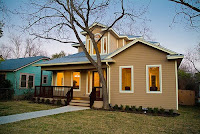Forty Percent Of Homeowners Are Financially Overextended
| September 24, 2008 | Posted by Roshawn Watson under Uncategorized |
 By: Roshawn Watson
By: Roshawn Watson
It is generally accepted that homeowners should not spend more than 30% of their income on housing costs (principle, insurance, taxes, and interest). However, due to overly optimistic buyers and disingenuous lenders, millions of homeowners have foregone the conventional wisdom in favor of purchasing homes without adequate resources. Now, at least 38% of homeowners’ housing costs exceed 30% of their incomes. Creative mortgage strategies (ARMs, balloons, etc.) have eroded safeguards that were in place to protect both consumers and mortgage companies. As widespread business failures and economic turmoil dominate the headlines, the true gravity of the housing crunch is being realized. It’s not just subprime mortgages that are the concern.
Image credit: bahia0019
Although on average 15% of homeowners are spending at least 50% of their income on housing costs, there is a huge geographic disparity. For example, more than one out of five homeowners with mortgages in San Francisco (and 13 additional metro areas) spend half or more of their income on housing. The most extreme examples were the homeowners of Miami-Fort Lauderdale-Miami Beach metro area: 58 percent of homeowners spending at least 30 percent or more of their incomes on housing costs, and 29 percent spending half of their incomes or more on housing. That means the majority of individuals who live in Miami-Fort Lauderdale-Miami Beach are house poor.
Affordability Problem
On The Brink Of Financial Disaster
Perhaps the most troubling aspect of this news is the fact that it is nearly inevitable that some financial hiccup will come along during the course of a mortgage. Life happens. With such a small margin between income and housing costs, many families are one misstep, hospitalization, or job loss away from financial disaster. If one is already stretched too thin, it does not take too much to send him into foreclosure, especially if he is already behind. According to the Mortgage Bankers Association, more than 4 million homeowners are at least one month behind on their loans, and 500,000 have formally started the foreclosure process (as of June 2008).
Long-term Impact of Being Overextended
If one’s money is tied up in his or her home, he or she can’t use that money for profitable and meaningful investments. Not that long ago, 50% of homeowners believed their homes to be their best long-term investment. However, that percentage has dropped to 27% recently according to Gallup. In truth, if one’s home is his biggest investment, that’s a problem in itself.
Unfortunately, an estimated 10 million homeowners owe more on their mortgages than their homes are worth, according to Moody’s economy.com. Home prices are expected to decline at least until the end of next year (of course there are geographic restrictions). This underscores the deleterious impact of purchasing a home before one’s financially ready. With a sufficient resources, one can wait out the painful correction of home prices and still come out ahead in the long run. However, depreciating “assets,” that were inflated to begin with, and inadequate incomes can compound and hasten one’s financial decline.
Additionally, it is incredibly difficult to invest for retirement, children’s education, and other things of value while simultaneously hemorrhaging 50% of your income. Despite emotional attachment, the best solution for many will be sell their homes (if they can) and rent for a while, at least until they have enough money to truly afford their homes.
Lastly, if you like this post, please subscribe, click here to get my Brand New eBook FREE, and Propel it, Stumble it, and tag it on Delicious.
Copyright 2008, Roshawn Watson, Pharm.D. All Rights Reserved.
Related Posts
American Dream: Asset Or Liability
Is Home Ownership Still A Good Investment
Home Prices Dropping Faster Than During the Great Depression
Copyright 2012, Roshawn Watson, Pharm.D., Ph.D. All Rights Reserved.







Pre tax or post tax?"It is generally accepted that homeowners should not spend more than 30% of their income on housing costs"
pre tax. Thanks for the question.
I wouldn't say the majority of people who live in Miami Beach are house poor. That 30% figure is based on some assumptions. The fact is, if I make $400,000/year and spend $200,000 on my home, I still have quite a bit left over. There are also quite a number of people earning way more than $400,000/year. Your "overextended" million dollar per year earner can still have up to $500,000 in disposable income. Just a thought. 🙂
Hello Jon. This was a very interesting comment. The truth is if you have a high income, you can be sloppy with your finances and not end up broke. Althouth the US census bureau says that the median income is around $48K or so, you are right in that some make a whole lot more. It's funny that this overextention is relative. For example, if someone makes $400K but has a net worth of $15 million, spending $200K/year on housing may not be the best financial advice. However, who cares. There are many people with high incomes who don't have huge net worths and feel very middle class. Good Old Middle Class or Wealthy, You Decide https://www.roshawnwatson.com/good-old-middle-class-or-wealthy-you/These HI earners should not be spending 50% ($200K/$400K) of their income. Thanks for sharing your thoughts!Shawn
Hi Shawn,Wow, thanks for replying so quickly! I know this post is almost a year old, so I wasn't sure if anyone would notice me or not. Anyway, it is appreciated – you just got yourself a new e-mail subscriber.
That's awesome Jon. I'm so happy that you're joining us here. BTW, you had a very intersting point, so I am thrilled to hear more of your thoughts.